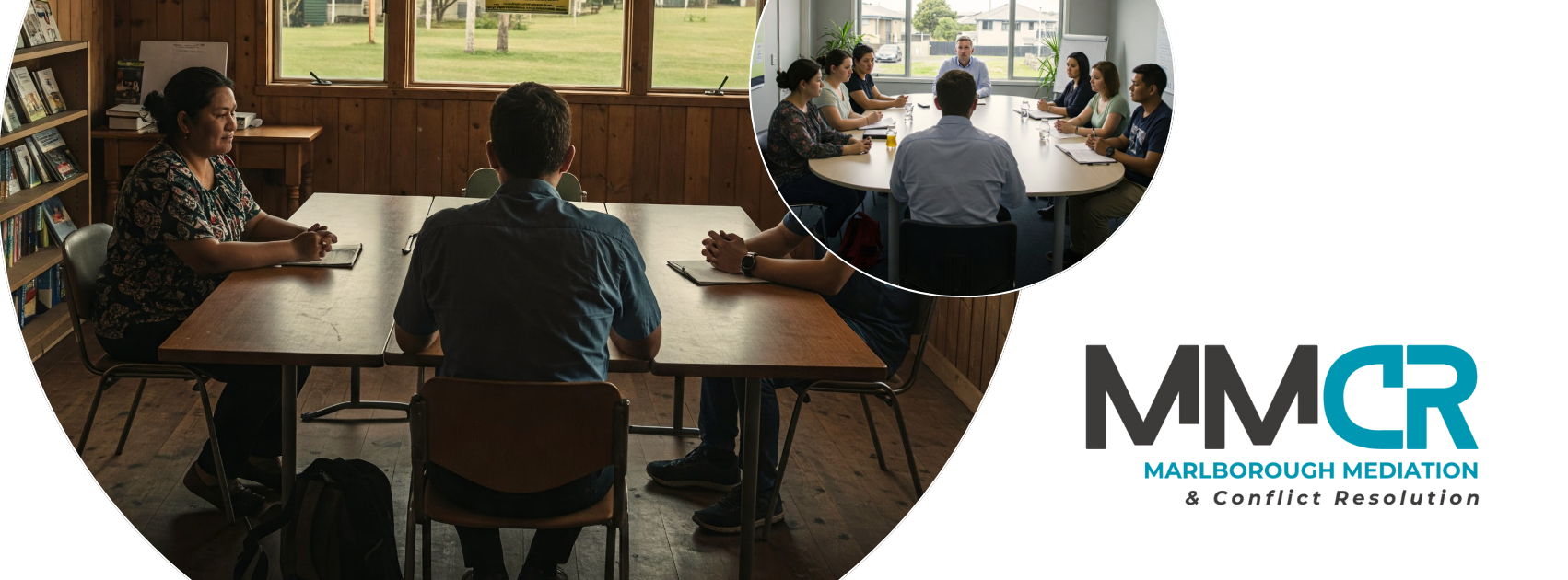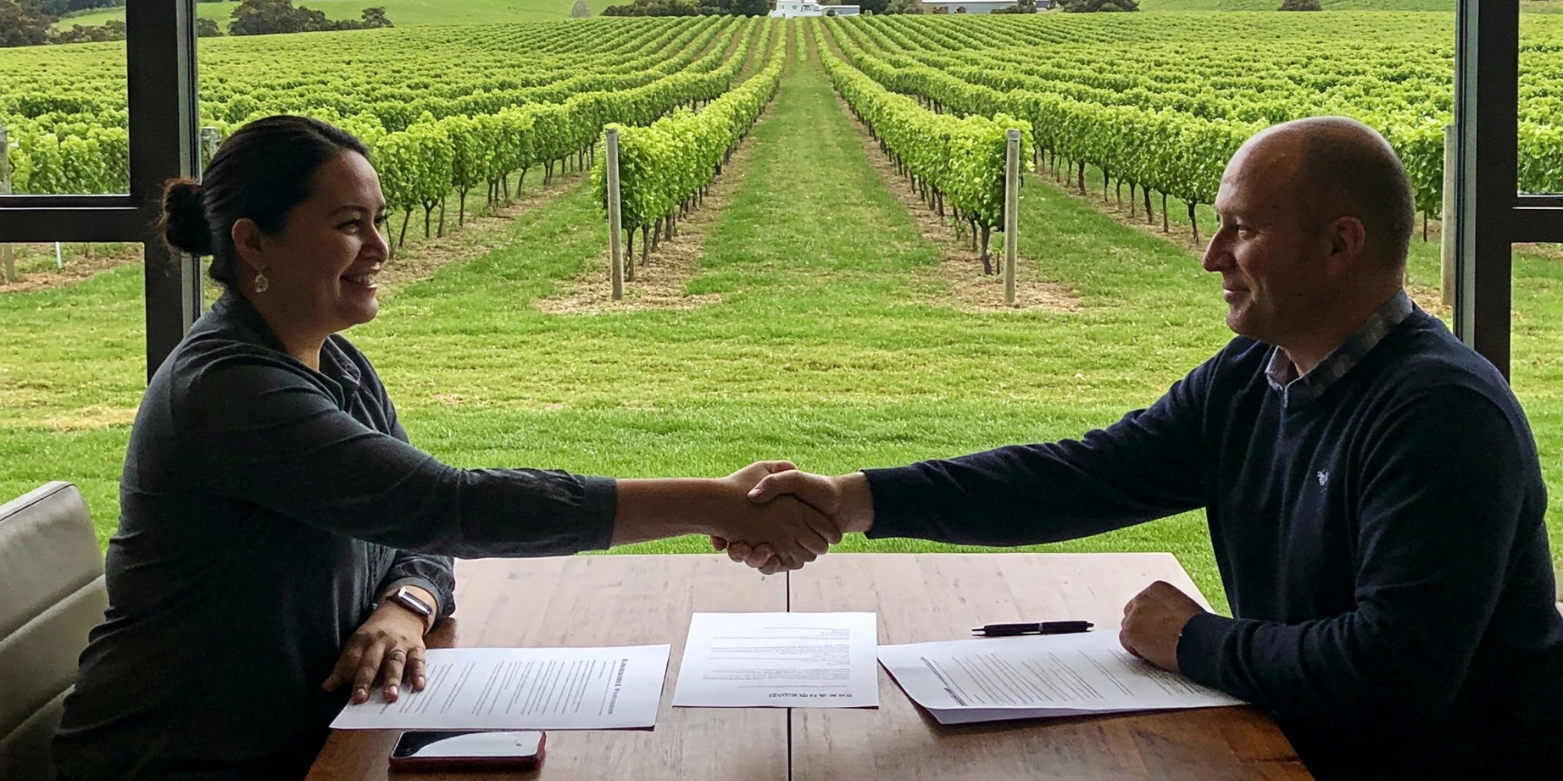Marlborough Mediation & Conflict Resolution
Real-World Experience | Practical Outcomes

Mediation offers a constructive pathway to resolve disagreements, bypassing the prolonged stress and significant expense often associated with court battles. As a recognised form of Alternative Dispute Resolution (ADR), it empowers you to achieve practical solutions more quickly, affordably, and with far less conflict than traditional litigation. By prioritising mutual agreement over adversarial fights, mediation helps preserve valuable personal and professional relationships.
Mediation puts you back in control.
Effective mediation requires strong interpersonal skills gained from real-world conflict resolution and a keen understanding of diverse contexts like families, workplaces, and business. At MMCR, we leverage extensive front-line experience managing high-stakes situations across Marlborough, Canterbury, and Otago. This background demanded advanced de-escalation, measured thinking, and robust conflict strategies (proven during challenges like the COVID-19 response) and was recognised through commendations in high-trust roles, ensuring skilled navigation of tense environments.
We combine this proven ability with experience gained across multiple fields involving business operations, group dynamics, client management, and established dispute resolution practices. We guarantee a mediation service that is transparent, supportive, and focused on practical outcomes.
Formal legal battles in New Zealand are notoriously draining, lengthy, and costly - often overshadowing the needs of those involved. The unfortunate current state of affairs is so widely understood that the Ministry of Justice itself now promotes out-of-court resolution where practicable. Mediation offers a faster, less expensive alternative to court, putting control back in your hands. By working collaboratively to shape your own agreement, you avoid having unwanted decisions imposed on you by the court, while having an improved chance of preserving the important personal, family, and professional relationships often damaged by hostile litigation.
Mediation empowers you to actively influence more favourable outcomes than those imposed by the court, with a focus on finding common ground.
Keeping You Out of Court | Save Time, Money, & Stress

MMCR provides skilled facilitation throughout Blenheim and Marlborough for a wide range of situations where direct communication and practical agreements are needed, helping you avoid court complexities. This includes:
Civil disputes
Boundary issues, noise complaints, pets, trees, etc.Employment disputes
Improving team communication, resolving interpersonal issuesFamily communication & arrangements
Helping resolve family disputes that don't require mandatory FDR pathwaysEstate & EPA disagreements
Avoid court battles over EPA & estate disputes, preserving family relationshipsTenancy disputes
Mitigate and resolve rising tensions between tenants/landlordsCommercial/consumer disputes
Where direct dialogue is preferred over formal litigationOther interpersonal conflicts
Requiring structured, impartial, and confidential facilitation
Why Mediation?
"Mediation can be a speedy, flexible, less formal and relatively inexpensive alternative to using the courts... A mediator helps the two sides discuss the problem, identify the issues, and try to come up with a solution that works."
"The main advantage of ADR (Alternative Dispute Resolution) is that it is cost-effective compared to going to court. The legal fees and time spent dealing with court procedures can be a huge disadvantage for smaller businesses."
"Mediation is very beneficial to parties that are motivated to settle and should regularly be encouraged where appropriate. Gatekeepers, particularly lawyers, should increasingly promote mediation to commercial users for further growth of mediation in New Zealand."
"Businesses using mediation will usually be picking themselves up and moving on much more quickly than those caught on the treadmill of litigation."
"Mediation is a voluntary process. It’s a private meeting where the parties try to resolve the claim with an outcome that everyone can agree to...Settlements reached during mediation are always voluntary... Anyone can refuse to sign it if they don’t agree with it..."
The Mediation Process | Guided Steps
Initial Contact & Inquiry
Get in touch via our contact form or phone for a confidential, no-obligation chat about your situation. We'll listen and explain how mediation might help.
Suitability Assessment & Intake
If mediation seems appropriate, necessary details will be gathered from all involved parties, explain the process and confidentiality rules thoroughly, and discuss fees.
Agreement to Mediate
Before the session, all participants sign an "Agreement to Mediate". This formalises understanding of the process, covering mediator impartiality, confidentiality, and costs.
Scheduling the Session
MMCR will work with all parties to find a mutually convenient date and time. For clients in Marlborough, sessions can be held at a neutral local venue. We also offer mediation throughout New Zealand via secure video conferencing.
The Mediation Session(s)
The MMCR mediator facilitates a structured discussion. Each party gets uninterrupted time to outline their perspective. The mediator helps identify key issues, encourages exploring options, reality-tests potential solutions, and guides constructive negotiation.
Documenting the Agreement
If you reach an agreement, the mediator helps draft clear, precise wording reflecting the agreed terms. This draft is for the parties to review, potentially seek legal advice on, and then sign if satisfied.
Concluding the Process
Whether a full agreement is reached or not, the mediation concludes. If an agreement is signed, parties receive copies. If not, parties are free to pursue other options, often with greater clarity about the core issues.
Our Commitment to You
Impartiality & Neutrality
A mediator does not take sides, provide legal advice, or judge who is right or wrong. The role is to manage the process fairly and ensure all parties have an opportunity to be heard.
Confidentiality
Discussions during mediation are private and generally 'without prejudice'. Strict confidentiality is always maintained, subject only to legal obligations (e.g., risk of harm), to create a safe space for open dialogue. See our Privacy Policy.
Voluntary Nature
Participation in mediation with MMCR is voluntary. Parties cannot be forced to attend or agree to anything. Any settlement reached is by mutual consent only.
Self-Determination
You, the parties involved, are responsible for the decisions made. The mediator facilitates the discussion and helps explore options, but does not impose solutions or make judgments - a preferable alternative to having an unwanted court-imposed judgement handed down on one or more parties.
Professionalism & Respect
MMCR adheres to high ethical standards and codes of practice relevant in New Zealand. A respectful environment is fostered, with a focus on constructive communication and practical problem-solving.
Frequently Asked Questions
It's a confidential, voluntary process where an impartial mediator/s help people in a dispute discuss their issues and collaboratively reach their own agreement. MMCR will facilitate communication and guide the process, but unlike court, decisions aren't imposed, and legal advice is not given. It focuses on finding practical solutions tailored to your situation.
MMCR focuses exclusively on mediation to find practical agreements without court involvement or legal representation, although participants may have a legal representative attend and give advice during the mediation process. Mediation is generally much faster – resolving in hours or days compared to the many months court often takes (as Ministry of Justice information sometimes indicates). It's also almost always significantly less expensive than litigation. Crucially, you keep control over the outcome, working towards a mutually agreeable solution, rather than having a decision imposed by a judge.
MMCR can assist with a wide variety of issues between parties where communication and practical solutions are key. This includes neighbour disputes (like fences, trees, noise), workplace conflicts, family communication issues, disagreements in clubs or volunteer groups, certain tenancy or consumer issues, and facilitating dialogue around estate matters or EPA arrangements to prevent escalation. See our Services list for more.
While you don't typically need a lawyer in the mediation session, sources like Community Law or CAB often suggest it can be wise to get independent legal advice before mediating to understand your position, or after - before signing a final agreement, especially for complex matters. MMCR provides facilitation only, not legal advice.
Many disputes are resolved efficiently, often within a single session or two lasting a few hours each. This is considerably faster than the court system. Our fee structure represents a significant saving compared to potential legal fees associated with litigation. Please contact us for a confidential chat about your specific needs and our costs.
Yes, confidentiality is a cornerstone. Discussions in mediation are generally considered private and 'without prejudice'. All parties, including the mediator, agree to keep the discussions confidential, subject only to exceptions required by New Zealand law (e.g., where there's a risk of harm).
Mediation has a high success rate in New Zealand, but agreement isn't guaranteed. If you don't reach a full resolution, the process is still beneficial as it often clarifies issues. Because it's 'without prejudice', you haven't lost your rights to pursue other options like the Disputes Tribunal or court afterwards if necessary.
Yes, in New Zealand, signed agreements we help document, often formalised as a 'record of settlement' or 'settlement agreement', are generally legally binding and enforceable for most civil, commercial, or standard employment matters. We can help with some family mediation requirements, however, we are not accredited for mandatory Family Dispute Resolution (FDR) pathways that may be required by the Family Court, nor do we hold the specific accreditation (e.g., via MBIE Mediation Services) required for mediating certain complex employment disputes tied to statutory processes like the Employment Relations Authority.
No. While we are based in Blenheim, Marlborough, we provide mediation services throughout New Zealand using secure video conferencing technology. This allows you to access our services conveniently regardless of your location.
Contact Us
Ready to explore a more constructive and cost-effective path? Contact MMCR today for a confidential, no-obligation initial discussion about your situation, whether you're in Marlborough or elsewhere in New Zealand. Let's see if our mediation approach is the right fit for you and help you avoid unnecessary legal stress.


